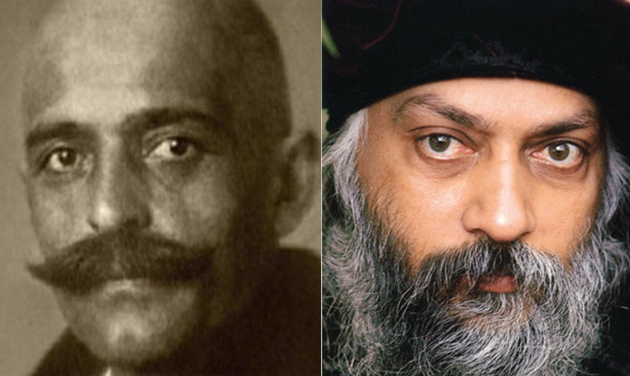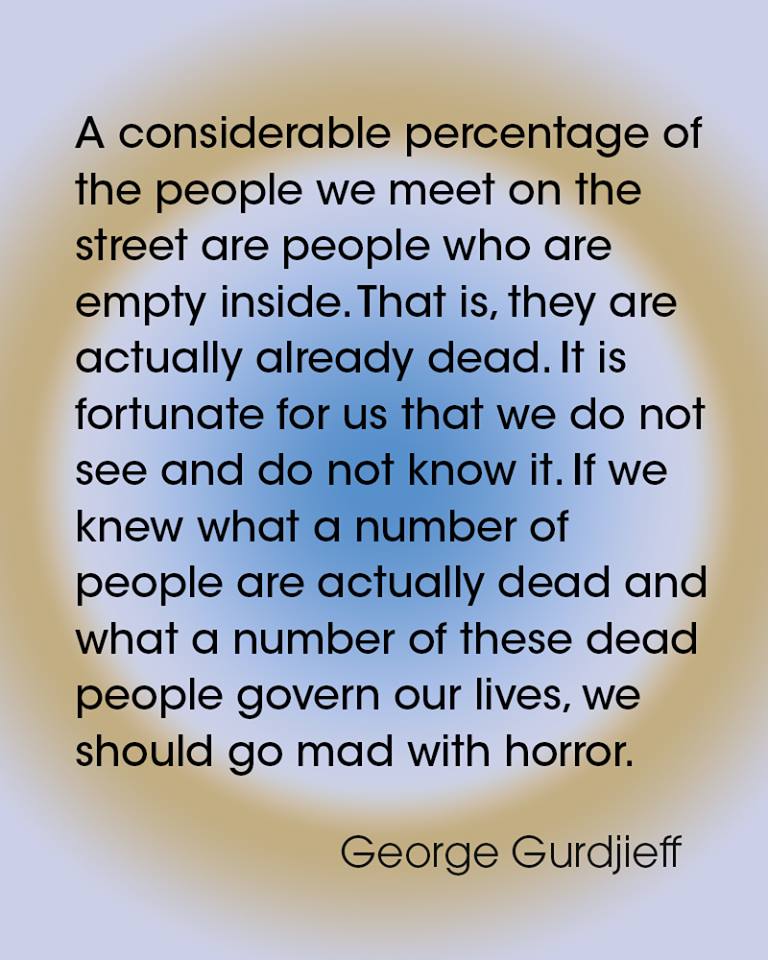In the late `80s, when I was living in India, I asked Osho the question below. I feel to share it here as it has been the centerpiece of my personal work, and now, my work with helping others with their transformation. Delving into the layers of the unconscious and transforming lifetimes of pain and suffering is also the central work of the Dalian Method.

 Beloved Osho,
Beloved Osho,
Gurdjieff is reported to have commented: “Ordinary men never experience true suffering and sorrow, for they live mechanical and routine lives, and their troubles are routine, automatic and inescapable. But a man who has willfully undertaken the extraordinary and unnecessary burden of the work, he alone knows the taste of real sorrow and sickness of heart, for he will suffer pain and pressures that life does not ordinarily require.”
Even though you tell jokes and fill our hearts with laughter while silently cutting our heads with your invisible sword, I feel sometimes you suffer most, from our sleep and unawareness. Please forgive us.
“… Jivan Mada, your question is certainly of very extraordinary significance. Only Gurdjieff, a man like Gurdjieff, could have made such a statement. But it is in fact true. He is saying: “Ordinary men never experience true suffering and sorrow, for they live mechanical and routine lives.” It is not that there is no suffering, but they are accustomed to it. Secondly, their suffering is repressed. They live on a very thin layer of consciousness; underneath is the whole hell. Once in a while it surfaces, but mostly the ordinary man lives his whole life without knowing how much suffering, how much misery he was carrying within himself.
In a way he is fortunate, and in a way the most unfortunate, because if he had become aware of this misery and suffering then there would have been nobody who could have prevented him from getting out of this unconsciousness, this routine mechanical life, and becoming an awakened, conscious being. But I say on the other hand he is fortunate that he does not know that he is carrying a whole hell within himself. Just a little prick in his bag and you will see how much misery, how much suffering. People don’t even talk about these things, because even these words may provoke their own suffering to surface. People don’t talk about death.
From my very childhood I used to go to every funeral. My father used to say, “People go to somebody’s funeral who is a relative or a friend or in some professional way connected. You are not connected with anybody, but it seems that whoever dies is your relative! You won’t go to school that day, you will go to the funeral — and nobody has invited you, nobody has even informed you! In fact people try to prevent the information from reaching to you, because you are an unnecessary harassment. People think, “Why have you come here?”
But I continued to go to every funeral that I came to know was happening. Whatever work I was involved in, I would drop then and there, and I would join the funeral procession. Even the people would see me and wonder: am I following them?
I said, “I am not following you, I simply want to see what you do there.”
They said, “You have seen — so many times!”
I said, “I still want to confirm it. A single exception and I will drop the whole idea.”
But without any exception I found the principle to be true, that when people take a dead body to the funeral, even on the funeral grounds they don’t sit looking at the funeral. They sit with their back towards the funeral pyre and talk about a thousand other things — but not about death, which is the most important thing that is happening. A man is burning just behind them and they are talking of stupid things… ‘What movie is going on, have you seen it?’
I could not believe that people are afraid to face things, because to face them means to know intensely that every death is a declaration of your death; that today you are seeing somebody on the funeral pyre and tomorrow somebody else will see you on the funeral pyre. They want to avoid the fact. Even to visualize it, themselves on the funeral pyre, shakes their whole being.
That’s what Gurdjieff is saying: True suffering and sorrow never become the experience of the ordinary man. And by ‘ordinary man’… he is not condemning anybody. He is simply saying, every unconscious man is an ordinary man. He is not even aware of himself — what can be more ordinary? He has lived a life of seventy years and he has not come across himself.
But the reason is that people create a barrier between themselves and their unconscious reality, which contains lives of suffering, pain. They are afraid to face it. And unless they face it, they cannot face that which is beyond suffering, that which is blissful, that which is our very nature — our eternity, our joy, our dance, our flowers.
People cannot reach their own flowers. A great barrier of unconscious repressed suffering…
And you know how suffering is repressed. For example somebody dies and you start crying. Immediately some wise guy is going to tell you, ‘Don’t be emotional; death is a natural thing, it happens to everybody. There is nothing in it. And it is not manly — tears? are you a woman?’ Even small boys are told, ‘Don’t be girlish.’ Their father has died and they cannot cry because that will expose them: they are not a man, unemotional, strong, courageous, who can face everything. This crying and weeping is left for women.
But that does not mean that this statement is true only about men and not about women. It is more true about men, but it is also true about women. They also go on suppressing their sorrow, their misery, in different ways. Just the ways are different. They distract themselves in their jewelry, in the television, in shopping, in going here and there, just continuously talking yakety-yak, yakety-yak. They are avoiding something, escaping from something. They don’t want to see it; they want to forget the wounds that are inside.
So in a way they are fortunate, but not really. The real fortunate ones are those of whom Gurdjieff says, “A man who has willfully undertaken the extraordinary and unnecessary burden of the work…”
Just look at his words: no master has been able to make such statements; that’s why he was the most misunderstood man one can imagine. He is saying, “A man who has willfully undertaken the extraordinary and unnecessary burden of the work…” And by `the work’ he means digging into your unconscious, going as deep as possible. Unless you reach to the very living source of your life you will have to suffer much.
It is unnecessary, he says, because you can live like an ordinary man. Nobody is forcing you. It is extraordinary, because ordinary people go to the church, not into themselves. They read the Bible, they don’t read their own unconscious. They worship in a temple, but they don’t expose themselves in meditation.
Gurdjieff used to call it ‘work’ because it is undertaken only by very intelligent, courageous and strong people — for the simple reason that you can live without going into all this, you can just be a stationmaster your whole life, or a businessman or a clerk, or a priest. There is no need to go into such suffering and sorrow.
But you will not get rid of it. Even in your next life it will continue, and it will gather more suffering from this life. Each life, layer upon layer goes on collecting all that has not been lived, expressed, the unfinished, unlived, the repressed.
In Buddhism — and perhaps only in Buddhism — there is a technique to find out how many lives you have lived before. And the way is to count the layers, just as by cutting the tree you can know the life of the tree by the circles, how many years, because each year one circle is made. So if the tree has been two hundred years old, you will find two hundred circles in the wood.
Exactly in the same way, every life leaves a circle of suffering and sorrow within you. It can be counted, how many lives you have been repressing, how many lives you have lived before. But the longer you have lived, the more difficult it becomes to enter into your inner kingdom.
The ordinary priest, the preacher, goes on talking about beautiful things — about good work, virtue, charity, sharing, and you will enter into the kingdom of God. It is not so easy. First you have to be finished with your whole unconscious. And that unconscious is what the mystics have called “the dark night of the soul.”
Only very intelligent people will take this unnecessary burden, because, “he alone knows the taste of real sorrow and sickness of the heart, for he will suffer pain and pressures that life does not ordinarily require.”
You can live very superficially, you can avoid the dark night of the soul, but if you avoid the dark night of the soul, you are avoiding all your treasures. You are avoiding the very meaning of your life and existence. Hence the intelligent man takes the challenge and enters into the dark tunnel, which seems to be unending. But it ends one day. If you go on with courage, knowing that people have passed beyond it — that is the beauty of being with a master, because you know that at least one example is before you and with you, who is standing outside of the tunnel and who is constantly calling you to enter the tunnel… because unless you enter, you cannot get out of it. There is no way to bypass it.
There are thousands of frauds in the world and their work is to tell you how to bypass the darkness and the suffering and the sorrow and just become enlightened. Just a transcendental meditation, repeating a certain name, and you will become a realized soul. There is no connection in it, there is no authentic work. What will happen to your unconscious? What will happen to your collective unconscious? You are trying to bypass them, just to leave them. That is not the way.
The way goes through them. You have to cut them and pass through them, knowing perfectly that there is someone with you who has already passed beyond it. Not that you need, as an absolute necessity, the presence of a master — if you have the heart and the trust, even a Gautam Buddha, twenty-five centuries back, will do. It depends on your trust, because there have been people all over the world who are confirming it: “Just enter the darkness of the unconscious watchfully, awake, alert, because that is the only way to pass through it.” Awareness is the only bridge between you and your ultimate flowering.”
~ Osho, Yahoo, the Mystic Rose







